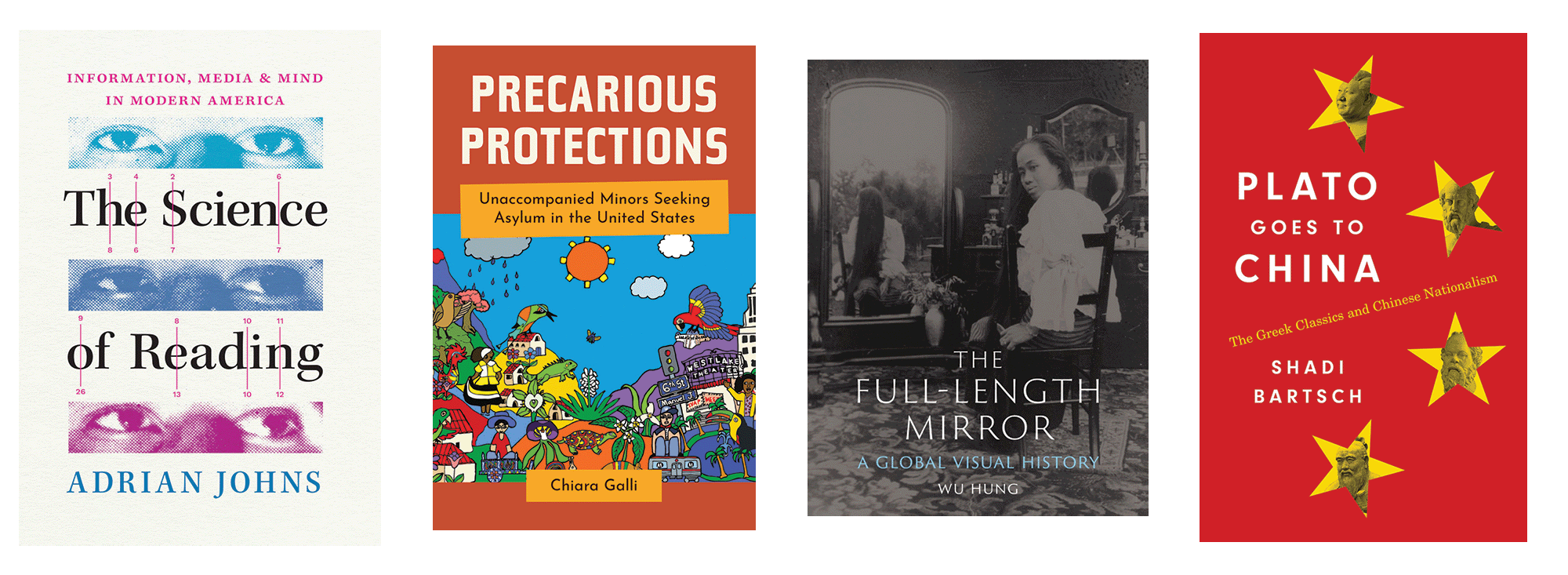
A selection of recent books by UChicago faculty members.
The Science of Reading: Information, Media, and Mind in Modern America
By Adrian Johns, Allan Grant Maclear Professor of History, of the Conceptual and Historical Studies of Science, and in the College
In 1908 the psychologist Edmund Burke Huey wrote that reading “has become the most striking and important artificial activity to which the human race has ever been moulded.” Huey was one of the earliest scholars seeking to understand what happens in the mind when we learn to read—a question scientists are still exploring today. In The Science of Reading, Adrian Johns chronicles the efforts of 20th-century experimentalists to study literacy and the still-raging “reading wars” over pedagogy, revealing yet unsettled questions about science and culture.
Precarious Protections: Unaccompanied Minors Seeking Asylum in the United States
By Chiara Galli, Assistant Professor of Comparative Human Development
Since 2009 more than three-quarters of a million unaccompanied minors have arrived at the US-Mexico border, many seeking asylum from countries plagued by violence and instability. Despite laws that promise to protect them, these children struggle to navigate the complex bureaucracies of the immigration system and prove their legal claims. Precarious Protections draws on Chiara Galli’s six-year ethnography of young migrants and their attorneys to disrupt common narratives about asylum seekers, who are typically portrayed as either frauds or helpless innocents. She also sheds light on the asylum process itself, which fails to recognize the wide array of risks youths face in their home countries.
The Full-Length Mirror: A Global Visual History
By Wu Hung, Harrie A. Vanderstappen Distinguished Service Professor of Art History and in the College
While the ancient Greeks, Romans, and Chinese attempted to build large reflective devices, the first full-length mirrors as we know them date back to 17th-century Europe. Wu Hung’s illustrated history shows how large mirrors crisscrossed the globe and gave viewers new perspectives on their visual environments. Regarded by the Greco-Romans as possessing supernatural powers, large mirrors later came to be viewed as a means of discovering the self. The book begins with a detailed history of these “alluring objects,” as Wu Hung calls them, before shifting to an investigation of full-length mirror portraiture, a popular 19th-century artistic form, and the use of mirrors in the work of Indian filmmaker Satyajit Ray.
Plato Goes to China: The Greek Classics and Chinese Nationalism
By Shadi Bartsch, Helen A. Regenstein Distinguished Service Professor of Classics and in the Program in Gender Studies
What do the Greek classics mean to Chinese readers? The answer to that question has changed dramatically since 1989, writes Shadi Bartsch. In the 19th century, Chinese scholars read Greek philosophy in hopes of understanding or even emulating aspects of Western democracy. But after the Tiananmen Square protests, interpretations of the Greek classics took on a new character, with the works of thinkers such as Plato, Aristotle, and Thucydides harnessed to support government interests and critique the West. By understanding these readings, Bartsch contends, we can learn more about both contemporary China and the continued relevance of the classics.
